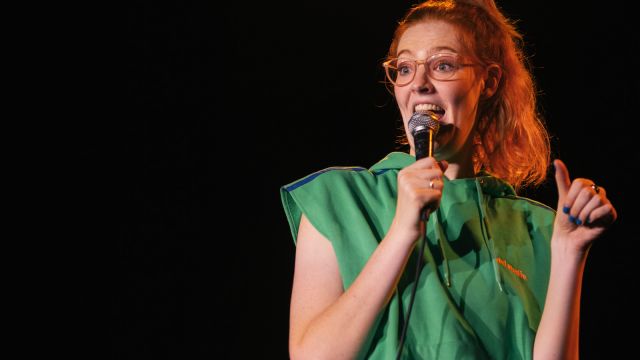Lou Wall vs The Internet
Lou Wall is 6’4’’ (they still use those old measurements), Gen Z, charismatic, engaging, bursting with frenetic energy and going so fast it can be hard to keep up. Their show is definitely ‘mixed media’: Lou, with hand mike, is a very alive presence, pacing up and down and across and back in front of a huge screen on which is projected a dizzying display of what the Internet can do to scramble your mind and your very sense of yourself – and, crucially, others.
If you saw Lou Wall’s digital piece That One Time I Joined the Illuminati during the Fringe Festival in the lockdown of 2021, you already know what they can do with electronic media – not just as a way to illustrate a case, but to create that case in itself - by using hundreds of clips, still photographs, and electronically treated, shattered and distorted images – i.e. the very resources and possibilities of the Internet. Yes, a clear case of ‘the medium is the message.’
In 2022, Wall took Illuminati on tour. I wish I had seen what a live presence in a theatre space did with that original, brilliant, revealing, and very funny show. In Illuminati, they showed us how an online identity can be confected and become dizzyingly more real than the real (if there is a ‘real’). It showed how identity is malleable and even divisible as we disappear down one rabbit hole after another pursuing and being taken in by other identities that are as diverse, shifting and fake as our own.
But the ostensible subject of investigation – there, the Illuminati - is really a premise, a set-up, a means to investigate the power and the traps of the internet itself, this phenomenon that is so all-pervasive and central to so many lives. In Lou Wall vs The Internet the means and the intention are not dissimilar.

Here, they begin by asking us ‘to think of the person [we] are most jealous of.’ It could be for their successes, their abilities, their charm, their good looks or just that certain indefinable quality that brings on a sense of inferiority (and resentment!) in us. And that person who inspires such jealousy may not even be a real person! They/he/she could be a collection of tropes and even lies, expertly curated.
That person may be a projection, a selective presentation, an Internet creation. Wall spends the bulk of the show talking about her own feelings of inadequacy – and the person who inspires that feeling, the person of whom they are so jealous.
But, in a relatively calm moment of reflection, Wall gives us a paradox: when they are with that person in the flesh, they are not jealous at all. That person even says she looks up to Lou. Lou brushes that aside: ‘I’m six foot four – everyone looks up to me.’
But that same person’s Internet persona – that glamorous, casually name-dropping, smartie-pants, clever-clever Internet persona - is quite another matter… What is it about an electronic fiction that can overwhelm our sense of reality, proportion and self-esteem? Is it because it is an Internet persona and therefore accessible to millions?
Wall’s video presentation (if presentation is quite the right word) is a marvel in itself: the selection of images and text and their structuring of them are amazing, displaying a facility born of great ability and long practice. We learn that Wall got their first computer when they were fourteen and very quickly found a way around the blocks and barriers to access social media. They have clearly not looked back.
(I must say I am a little haunted by the image of this six-foot four (that’s 193.04 cm) individual hunched over a screen and keyboard - for hours.)
Chortle UK called Lou Wall ‘the voice of a generation’ – and that may well be true – but Wall’s voice has more humour, intelligence and insight than is usually associated with a voice of a generation.
Michael Brindley
BUY TICKETS TO MELBOURNE INTERNATIONAL COMEDY FESTIVAL HERE.
Subscribe to our E-Newsletter, buy our latest print edition or find a Performing Arts book at Book Nook.

